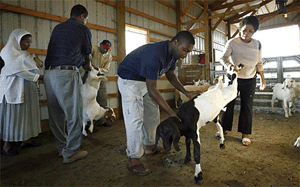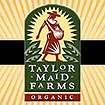Ind. farmer offers kill-it-yourself meat
|
Olu
Egunyomi, center, and his aunt Emily Egunyomi, right, originally
from Nigeria, pick out a goat Sept. 29.
By Sam Riche, The Indianapolis Star |
By
Tim Evans, USA TODAY
HAZELWOOD,
Ind. - The morning sun is only beginning to peek over
the horizon, but Tom Prince's farm 20 miles west of Indianapolis
is already abuzz.
Cars,
pickups, minivans and taxicabs are parked next to a small metal-sided
barn behind Prince's neatly kept farmhouse. Inside, the strains
of a half-dozen languages echo in the background as a Muslim man
kneels over a goat, says a brief prayer, then cuts the animal's
throat. It's hard to imagine a greater cultural mishmash than
the early morning gatherings that take place here every Friday
and Saturday.
Since
1999, Prince has operated a self-service slaughterhouse that specializes
in providing goat meat to the Indianapolis area's growing international
community. His card reads "You Buy - You Kill - You Dress
- You Take Home," and business is booming. Prince also sells
lamb and sheep, but goats are the big seller.
Prince,
80, runs the facility from 7 a.m. to 1 p.m. every Friday and Saturday,
selling an average of about 50 goats per weekend. In the weeks
before Muslim and other religious holidays, he says, sales often
double.
Prince's
slow Southern drawl stands out from the languages spoken by customers
who have found their way to Central Indiana from Morocco, Yemen,
Nigeria, Kenya, Pakistan, Mexico and other places around the globe
where goat is a dietary staple.
"When I moved out here in 1969, I bought four or five goats
just for myself," says Prince, who developed his taste for
goat as a child growing up in rural Tennessee during the Depression.
"Then an African fellow came out and asked me if I'd sell
him some. I sold him two, and he said he'd be back next week for
two more, and that's what really got me started."
Prince
says his business continues to grow - even though he doesn't advertise
or have a website - thanks to word-of-mouth recommendations.
The
attraction for many is the freshness of the meat and the low price
of $1.40 per pound live weight - the weight of the animal before
it is butchered. The price includes the use of the facility. Prince
said most of the goats weigh 50 to 70 pounds, so the price ranges
from $70 to $98.
Goat
meat sells in markets and on the Internet for prices ranging from
$3 to more than $20 a pound, depending on the cut. Shanks are
the cheapest; filets, the most expensive. Tropical Foods, an Indianapolis
specialty market, sells 2-pound packages (mixed cuts) for $3.99
a pound. Grande Premium Meats in Del Norte, Colo., and Dancing
Creek Farm in Cascade, Va., are among the companies that sell
goat meat on the Web.
For
some, butchering their own meat helps maintain a link to cultures
they've left behind in Africa, Central America and the Middle
East. Others, including the large number of Muslims who buy from
Prince, prefer to kill and butcher the animals themselves to ensure
food preparation standards of their faith are followed.
Prince
said he doesn't know a lot about Islam, but he is savvy enough
as a businessman to make sure the slaughterhouse meets their needs
- including situating the killing table so it faces east toward
Mecca.
Muslim
customers such as Ahmed Awad, 37, of Indianapolis say they appreciate
the nod to their faith. A native of Yemen, Awad has come to the
slaughterhouse about once a month for the past year to get meat
for his family.
"You
can buy goat a lot of places," he says, "but I want
to kill it myself."
Prince
says he used to let customers butcher the animals in an old corn
crib next to his barn. As more people came to buy goats, the increasing
activity led to complaints. "A government inspector drove
up one day and told me I couldn't kill any more goats here,"
says Prince, who didn't have a license to do business at the time.
Prince
quit selling his goats, but former customers kept calling. The
requests prompted him to get back into business and do it right.
He built the do-it-yourself slaughterhouse that complied with
state licensing, health and sanitation standards.
"It's
interesting learning how people from the different cultures prepare
and use all the parts of a goat," says John Hadley, 44, a
middle school janitor who lives nearby and is one of seven part-time
employees that help out at the slaughterhouse on Saturdays.
"We get a lot of fathers out here teaching their sons things
they learned from their fathers and grandfathers," Hadley
says. "It's really neat to see all these people keeping their
family and cultural traditions alive."
Tim
Evans reports for The Indianapolis Star.
|













